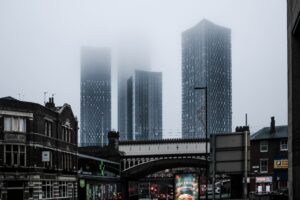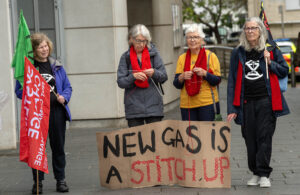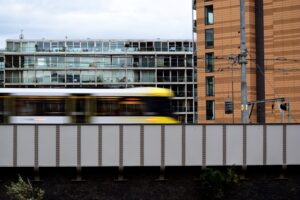Interview: Making Manchester resilient to risk
Greater Manchester’s Chief Resilience Officer Kathy Oldham talks to NewStart about how the city is preparing for climate change, the lessons from the pandemic, and how they are addressing existing inequalities.
The Making Cities Resilient 2030 initiative, which launched in January, has recently named Greater Manchester, Barcelona, Helsingborg and Milan as the first global Resilience Hubs.
As the first UK city to hold the title, NewStart caught up with Greater Manchester’s Chief Resilience Officer, Kathy Oldham, to get her reaction to the award and find out what other local areas and cities can learn from Manchester’s resilience leadership.
Kathy Oldham says it is a ‘great honour’ for the area to be recognised: ‘We are the first city in the UK to be recognised in this way, and it reflects a whole number of years of really working on resilience, and also trying to support other cities across the world with their resilience activity.’

The changing climate
Greater Manchester faces a range of risks specific to its population and geography. Like many regions, climate change is expected to take its toll, leading to dangers from flooding to extreme heat.
Kathy explains that even if warming is kept to 1.5 degrees, the area should still expect more frequent and intense rainfall, with homes and businesses at risk of flooding. More than 162,000 properties in Greater Manchester are currently at risk of surface water flooding and around 60,000 are at risk of river flooding, so this issue is already at the forefront of risk management.
Some of the most visible preparations being made in Greater Manchester to tackle flooding risk include building defences and flood basins. However, the resilience team are also working to use the area’s geography to its advantage, attempting to hold rainwater on the Moorlands and preventing it from running off into towns and cities.
On top of the hills, there is a special kind of peatland, known as a blanket bog, that can absorb 20 times its own weight in water thanks to the Sphagnum moss that populates it. Kathy explains that they are replanting these natural peatlands and making sure the bogs are healthy, so that they will act as an ‘amazing sponge’ around Greater Manchester, preventing flooding.
Elsewhere in West Gorton, they have built a sponge park, known as ‘The Park that Drinks Water’, which contains permeable surfaces, swales and trees that will absorb rainwater, and has already proved its use against Storm Christoph.
‘It’s a great example of how you can adapt the environment and use nature to stop flooding. We had Storm Christoph just after the park was finished at the beginning of the year, and it proved its worth in terms of absorbing all that water instead of flooding,’ says Kathy.
Another risk, that is perhaps less obvious for a city in the North of England, comes from extreme heat. We do not often see this threat in the UK now, but is expected to affect the very young, very old and people with underlying health conditions more frequently in the future. Manchester is already thinking about how it can prepare to face these risks from climate change, such as planting trees for shade during heatwaves and creating public advice.
Although it is difficult to foresee when these issues will become more prominent, Kathy says they are not as far in the future as people think.
‘The issue of timing is probably unanswerable because some people could argue that we are already seeing the impacts now, but it’s still a matter of debate. From my perspective, our job is quite specific in that we plan for risks we are likely to see in the next five years, and we are planning for flooding and heat waves.’
Preparing for pandemics
The Covid-19 pandemic has tested our resilience to disease outbreaks globally. Kathy explains the work Greater Manchester has been doing to fight the pandemic on a local scale.
‘Covid-19 is not the first pandemic or epidemic we have experienced, but globally it has got to be one of the worst we have ever seen. Obviously, the response is ongoing, and it has been a huge response.
‘Some of the things that stand out for me were providing good statistics and information so that people could make informed choices, because at the end of the day, controlling the virus is all about how people behave and interact with one another. We know that at points people have found the messaging confusing, so we have done a lot of behavioural insight work to try to understand how people are thinking and how that is informing what they do, so that we can adjust local messaging to help. We have also done things like setting up local contact tracing arrangements, because we found that people tend to trust local people and voices.’
Kathy believes that the pandemic has highlighted the importance of local resilience and responses to risks.
‘Although it has been a national response, for me it has shown the importance of local responses – building trust between local agencies and local communities. I think what people wanted was their locality to deal with the impacts, building on that sense that everybody has been part of a local community and helping each other get through it.’
Because of the global nature of the crisis, Greater Manchester has also been able to share knowledge with and learn from other countries as they respond to Covid-19, which has solidified the international connections that make it a global Resilience Hub.
The economics of existing inequalities
When we talk about floods and disease outbreaks, we are looking at shocks or things that cannot be foreseen, but another way to look at resilience is through pre-existing stresses. These existing inequalities mean that certain areas of society are disproportionately impacted by shock events, which only makes the stresses worse than before.
Kathy explains that when you look at the economy, these stresses really come to the forefront.
For example, an independent prosperity review in Greater Manchester found a link between health inequalities and weak productivity, so the local authority has begun to address health inequalities as an economic issue.
They are also working to address poor transport links in the city, and it has been found to have an impact on the local economy.
Kathy and her team have also identified digital exclusion as a key stressor in Greater Manchester, predicting that over a million people in the area are affected by it.
Surprisingly, their research suggests that 44% of people who are offline in Greater Manchester are under the age of 60.
Kathy explains that this poses a number of risks, from people being cut off from health services, education and socialization during the pandemic, to paying more for goods and services without the ability to use price comparison services online and impacts on employment opportunities.
‘I think the reason it’s so important for me from a resilience perspective is if you think about the basic services you need in life – namely water and food and a home – you also need digital access nowadays.’
Action the local authority is taking to tackle digital exclusion includes its Tech Fund, which supports young learners to face digital isolation, giving them the technology and connectivity they need to continue their learning at home. This scheme has reached thousands of young people since early 2020.
Lessons for local authorities
Despite the negative impacts, some risks can also be great opportunities for positive change according to Kathy: ‘We have got some quite ambitious targets around the transition to net zero, and in some ways, you could see that as an economic risk, given the costs involved. However, in Greater Manchester we really see it as an opportunity, because we can create new jobs and new businesses in the green economy.’
Kathy advises that other local authorities try and prevent risks, instead of simply responding to them, and have a clear way of thinking about resilience.
‘Every decision we make needs to think about disaster risk – would this decision create emergencies or reduce the likelihood or impact of them?’
Photo by Zach Rowlandson and Matthew Waring
















